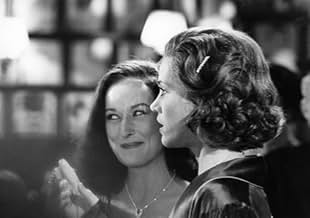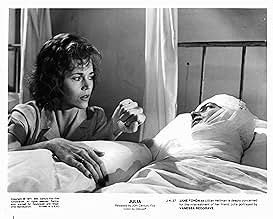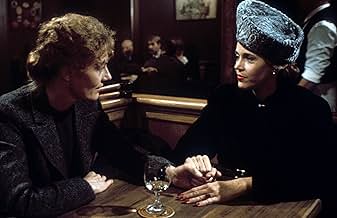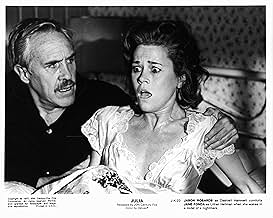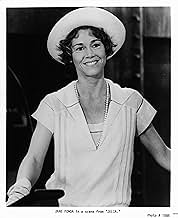At the behest of an old and dear friend, playwright Lillian Hellman undertakes a dangerous mission to smuggle funds into Nazi Germany.At the behest of an old and dear friend, playwright Lillian Hellman undertakes a dangerous mission to smuggle funds into Nazi Germany.At the behest of an old and dear friend, playwright Lillian Hellman undertakes a dangerous mission to smuggle funds into Nazi Germany.
- Director
- Writers
- Stars
- Won 3 Oscars
- 21 wins & 26 nominations total
Gérard Buhr
- Passport Officer
- (as Gerard Buhr)
- Director
- Writers
- All cast & crew
- Production, box office & more at IMDbPro
Featured reviews
"Lillian Hellman in her own mind owned half the Spanish Civil War, while Hemingway owned the other half. She would portray herself in situations that were not true. An extremely talented, brilliant writer, but she was a phony character, I'm sorry to say. My relations with her were very guarded and ended in pure hatred." This is a quote from Fred Zinneman--the man who directed "Julia" and who, apparently, was angry that this supposedly true story turned out to be a fabrication by Hellman. The story behind "Julia" is from "Pentimento"--a fictional memoir (how can you have a FICTIONAL memoir?) by Hellman which was published in 1973. This is because although Hellman described the events as having happened to her, according to several sources, they apparently occurred to another woman, Muriel Gardner.
Despite the story most likely being a lie, the film itself is quite well made. The location shooting was quite nice and Jane Fonda (as Hellman) and the director did very well. It's odd, then, that Oscars went to Jason Robards and Vanessa Redgrave (Julia), as both (particularly Redgrave) were barely in the film. Additionally, Maximillian Schell was nominated even though his role was minuscule in the film (as one reviewer said, he was nominated for 'eating eggs'). Overall, a taut and lovely story. Too bad it's just not real--especially since Hellman's story practically portrays her as a saint!!
Despite the story most likely being a lie, the film itself is quite well made. The location shooting was quite nice and Jane Fonda (as Hellman) and the director did very well. It's odd, then, that Oscars went to Jason Robards and Vanessa Redgrave (Julia), as both (particularly Redgrave) were barely in the film. Additionally, Maximillian Schell was nominated even though his role was minuscule in the film (as one reviewer said, he was nominated for 'eating eggs'). Overall, a taut and lovely story. Too bad it's just not real--especially since Hellman's story practically portrays her as a saint!!
Just cast an eye at the credits (Jane Fonda, Vanessa Redgrave, Jason Robards, Maximillian Schell, Hal Holbroke, Meryl Streep, John Glover and others directed by Fred Zinneman in a story by Lillian Hellman) and you know this film is worth seeing. It delivers fabulous performances by some of the best actors of our time, in a carefully -- yeah, sumptuously -- produced film directed by one of Hollywood's most respected veterans, based on a narrative by a gifted dramatist and tale-spinner.
The screenplay blends the two longest episodes in Lillian Hellman's PENTIMENTO, the third, most engaging, and most imaginative of her memoirs. It traces the (largely factual) struggle of Hellman to develop her talents as a playwright under the tutelage of her long-time lover, Dashiell Hammett, and the (largely fictional) course of her friendship with an anti-Nazi activist. The character of Julia seems to be part fantasy, part composite of women Hellman admired.
The film suffers from this blend of fact and fiction and even more from the episodic nature of the intermixed stories. In addition (and to its credit), it does not minimize Hellman's famously abrasive personality. But the characters are so compelling, the performances so outstanding, and the pacing so canny that it holds the viewer's interest for a full two hours.
A flawed but fascinating flick!
The screenplay blends the two longest episodes in Lillian Hellman's PENTIMENTO, the third, most engaging, and most imaginative of her memoirs. It traces the (largely factual) struggle of Hellman to develop her talents as a playwright under the tutelage of her long-time lover, Dashiell Hammett, and the (largely fictional) course of her friendship with an anti-Nazi activist. The character of Julia seems to be part fantasy, part composite of women Hellman admired.
The film suffers from this blend of fact and fiction and even more from the episodic nature of the intermixed stories. In addition (and to its credit), it does not minimize Hellman's famously abrasive personality. But the characters are so compelling, the performances so outstanding, and the pacing so canny that it holds the viewer's interest for a full two hours.
A flawed but fascinating flick!
To rediscover Julia in 2017 is an absolute thrill. It was thrilling the first time round but, as it happens, nine times out of ten, thrills don't travel well. Here is the exception. Time, through Jane Fonda and Vanessa Redgrave has added an extra coat of guts and truth. They were magnificent then and they are magnificent now. As actresses, as women. The friendship of Lilli and Julia is a landmark of historical, artistic and human proportions. Fred Zinnemann, the director, clearly knew what he was dealing with, brilliantly. Julia also counts with the extraordinary Jason Robards as Dashiel Hammett and, my goodness, Meryl Streep! in a small but memorable part, making her film debut. I believe this is one of those rare films that will be relevant for ever.
JULIA is a fine film. Fonda as Hellman is very good as is Robards as Dashell Hammett. But the real prize is the performance of Vanessa Redgrave as Julia. Though her part is small she is absolutely glowing as Julia. Her face is very radiant and she projects so much with her eyes. She is a great actress indeed.
The story of Julia is taken from Pentimento the second of three volumes of memoirs by American playwright Lillian Hellman. Hellman who was still alive at the time this film was made surely must have been flattered by what Jane Fonda and the rest of the cast did with an intimate and painful portion of her life.
Lillian Hellman was a radical and unorthodox character in her life and times. She was the first major American writer to bring a lesbian theme to the stage in The Children's Hour. What she gives us in Julia is a look at her life and how she was able to create the characters of Karen and Martha the schoolteachers from The Children's Hour.
In this story Karen and Martha are Jane Fonda as Lillian Hellman and Vanessa Redgrave as her most intimate friend Julia. Both are Jewish, but Redgrave is British and Hellman is American. Their destinies seeming to be fated for togetherness are driven apart as Julia decides to go to university in Vienna to study under Sigmund Freud.
But while Hellman struggles to create a play under the tutelage of lover and mentor Dashiell Hammett as played by Jason Robards, Jr., Julia gets herself involved in the anti-fascist activities in an Austria already preparing for Anschluss. While Hellman is visiting Julia sustains some very serious injuries during a Nazi inspired riot.
As the story continues Hellman meets great acclaim with her first major hit which turns out to be The Children's Hour, but her communications from Julia become more and more infrequent and somewhat bizarre. Then she's asked on another trip to smuggle money into the Third Reich to aid Julia and others fleeing Hitler's tyranny.
Director Fred Zinneman who was also a refugee from the Anschluss of Austria knew his subject well. He successfully transfers his memories and visions of a frightened people with good reason to be frightened. Fonda's American experience doesn't prepare her for this, but as Hellman she adapts to the environment well for her survival. Her budding celebrity no doubt helps insure her survival.
But the one you will remember is Vanessa Redgrave who won a Best Supporting Actress Oscar as Julia. The last scene of her and Fonda together at a Berlin train stop café is no doubt what won her the Oscar. It will haunt you long after you've seen the film.
Julia won two other Oscars, one for Best Screenplay adapted from another source and Best Supporting Actor for Jason Robards, Jr. as Dashiell Hammett. Sharing sex, literature, and politics wasn't enough for the Hammett/Hellman duo, Robards as Hammett knows well that he runs second as will anyone else in Fonda's life to her lost Julia. But he's secure enough to realize it and enjoy what he has.
Maximilian Schell was also up for Best Supporting Actor in a small, but vital role as an anti-Nazi German who gives cryptic guiding instructions to Fonda on her last visit to Julia. It's through him that the fright of the opposition is seen mostly. Meryl Streep made her screen debut as an upper class snob of a friend that Fonda has and Strepp has a brother in John Glover. Glover specializes in portrayals of truly hateful people on the big and small screen. He confesses a breaking a major taboo to Fonda while drunk and then snickers at her relationship with Redgrave. Jane handles him appropriately.
Julia was also up for a flock of other Oscars including Best Picture, Best Director for Fred Zinneman and Best Actress for Jane Fonda. It's a beautiful and haunting film about Lillian Hellman writing from the heart about a lost love.
Lillian Hellman was a radical and unorthodox character in her life and times. She was the first major American writer to bring a lesbian theme to the stage in The Children's Hour. What she gives us in Julia is a look at her life and how she was able to create the characters of Karen and Martha the schoolteachers from The Children's Hour.
In this story Karen and Martha are Jane Fonda as Lillian Hellman and Vanessa Redgrave as her most intimate friend Julia. Both are Jewish, but Redgrave is British and Hellman is American. Their destinies seeming to be fated for togetherness are driven apart as Julia decides to go to university in Vienna to study under Sigmund Freud.
But while Hellman struggles to create a play under the tutelage of lover and mentor Dashiell Hammett as played by Jason Robards, Jr., Julia gets herself involved in the anti-fascist activities in an Austria already preparing for Anschluss. While Hellman is visiting Julia sustains some very serious injuries during a Nazi inspired riot.
As the story continues Hellman meets great acclaim with her first major hit which turns out to be The Children's Hour, but her communications from Julia become more and more infrequent and somewhat bizarre. Then she's asked on another trip to smuggle money into the Third Reich to aid Julia and others fleeing Hitler's tyranny.
Director Fred Zinneman who was also a refugee from the Anschluss of Austria knew his subject well. He successfully transfers his memories and visions of a frightened people with good reason to be frightened. Fonda's American experience doesn't prepare her for this, but as Hellman she adapts to the environment well for her survival. Her budding celebrity no doubt helps insure her survival.
But the one you will remember is Vanessa Redgrave who won a Best Supporting Actress Oscar as Julia. The last scene of her and Fonda together at a Berlin train stop café is no doubt what won her the Oscar. It will haunt you long after you've seen the film.
Julia won two other Oscars, one for Best Screenplay adapted from another source and Best Supporting Actor for Jason Robards, Jr. as Dashiell Hammett. Sharing sex, literature, and politics wasn't enough for the Hammett/Hellman duo, Robards as Hammett knows well that he runs second as will anyone else in Fonda's life to her lost Julia. But he's secure enough to realize it and enjoy what he has.
Maximilian Schell was also up for Best Supporting Actor in a small, but vital role as an anti-Nazi German who gives cryptic guiding instructions to Fonda on her last visit to Julia. It's through him that the fright of the opposition is seen mostly. Meryl Streep made her screen debut as an upper class snob of a friend that Fonda has and Strepp has a brother in John Glover. Glover specializes in portrayals of truly hateful people on the big and small screen. He confesses a breaking a major taboo to Fonda while drunk and then snickers at her relationship with Redgrave. Jane handles him appropriately.
Julia was also up for a flock of other Oscars including Best Picture, Best Director for Fred Zinneman and Best Actress for Jane Fonda. It's a beautiful and haunting film about Lillian Hellman writing from the heart about a lost love.
Did you know
- TriviaLillian Hellman: the source story author and the film's primary subject as the shadowy person sitting in the fishing boat at the beginning and end of the film. Jane Fonda did the voice-over. This appearance is Hellman's only film.
- GoofsThe French train dining room had the menu title as the English word menu instead of the French word.
- Quotes
Dashiell Hammett: [after reading Lillian's play] You better tear this up. It's not that it's bad, it's just not good enough, not for you.
- SoundtracksMy Blue Heaven
(uncredited)
Music by Walter Donaldson
[Song that the young Julia and Lily dance to that is played on the record]
Details
- Release date
- Country of origin
- Languages
- Also known as
- Julija
- Filming locations
- Winterton-on-Sea, Norfolk, England, UK(The New England beach and beach house scenes)
- Production company
- See more company credits at IMDbPro
Box office
- Budget
- $7,840,000 (estimated)
- Gross US & Canada
- $20,714,400
- Gross worldwide
- $20,714,400
Contribute to this page
Suggest an edit or add missing content



